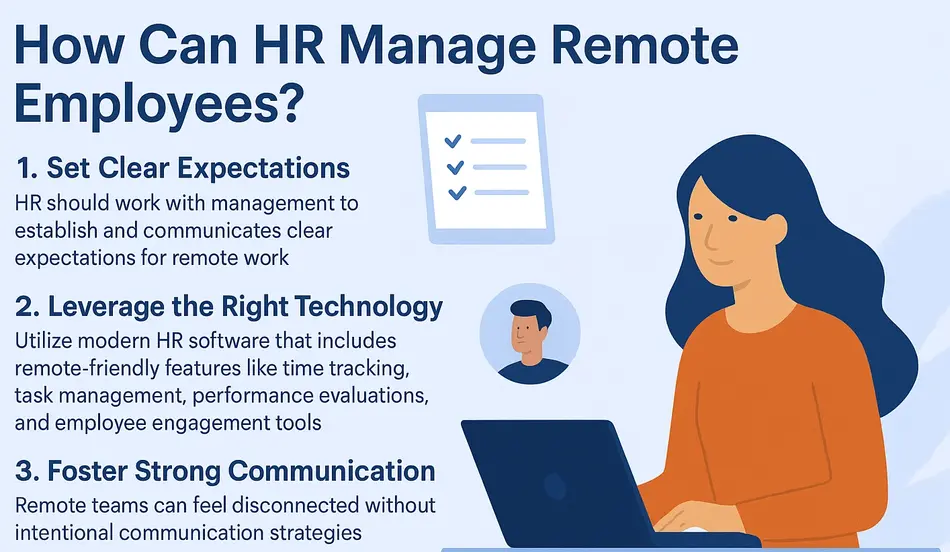Remote working is continuing to boom as businesses shift away from traditional office setups. By cutting down on overhead costs and allowing employees to enjoy an improved work-life balance, over half of all employers are now offering remote work.
Although the benefits of remote work are undeniable from both a business and employee perspective, it can pose some new challenges for HR departments.
Managing a workforce remotely requires strong HR software that aligns with the evolving needs of modern businesses. For growing teams, especially those that need to onboard new employees virtually, having the right software in place is essential to meet the demands of a remote work environment.
In this article, we discuss the added duties of HR professionals within remote businesses and the challenges they face. We then explore the importance of HR software when catering to a growing remote workforce.
How Can HR Manage Remote Employees?
The HR department of a remote business is required to find new solutions that allow them to manage a team that they do not physically see.
A modern HR software, like PeopleHR, is needed to streamline HR processes and allow employees the ability to self-serve. Employees need to be able to log into their personal accounts and access their documents, whether that be their timesheets, holiday request forms, or appraisal notes

.
Communication is more important than ever when a team is working remotely, providing a virtual support network. To ensure that the workforce is happy, working towards the same goals, and aware of any company updates, the HR team needs to maintain an open communication channel that ensures everyone is aligned.
One of the key responsibilities of an HR department is to support employee well-being, and remote workers should be aware of the processes in place to assist them. Any personal concerns, whether related to physical or mental health, family issues, or conflicts with colleagues, should be addressed in a confidential video call to determine the best course of action.
The Challenges of Managing a Remote Business
In comparison to traditional office-based companies, remote businesses are likely to face some extra challenges when managing their employees.
Onboarding new employees
When a new member of staff is hired, the onboarding process is not as straightforward in a remote business. Instead of being able to set up the equipment, demonstrate the processes, and be on-hand to answer any questions, the process needs to be managed virtually. As well as HR needing to overcome the physical barriers associated with the onboarding process, the remote nature risks the new employee feeling isolated when having to learn without the support of a mentor by their side.
Tracking productivity
Without an office environment that allows management to see what their team is up to, remote businesses can struggle to monitor the performance of employees. Although there is a range of software available to track time and the use of software, this can lead to micromanagement concerns. Finding the right balance between trusting employees to do their jobs and managing workload can come with some teething issues.
Establishing company culture
Many HR teams can find it challenging to maintain a united workforce since employees are working virtually. Without the office culture, it can be difficult for people to connect with each other and build up a strong team dynamic, resulting in 60% of workers feeling less connected to their colleagues. This can be especially noticeable if the team works across different time zones, reducing the hours in which working days overlap.

HR Software Requirements for a Growing Remote Business
Running a successful remote business means overcoming the challenges faced when not working in traditional office settings. This requires modern HR software designed to suit the new working landscape.
There are a range of software features that cater to the needs of remote employees, helping the HR department stay on top of daily operations:
Self-service portal: Every employee should have access to a portal that offers them access to their own information. Compiling key documents such as payslips, holiday forms, personal details, and job contracts keeps important documents together and allows HR to access and update the individual files of each employee when necessary.
Collaboration platform: Since employees are not physically seeing their colleagues, having a platform to facilitate ongoing communication is essential. Every employee should have their own account that allows them to message, voice call, and video call their team, either one-on-one or in a group. Having this centralised platform also allows managers to create groups for their teams and enables HR to send out company-wide updates.
Online training: When a new employee joins a remote business, a seamless onboarding experience is required since they do not have the physical support of their mentor. A HR software that includes online training materials, digital contracts, and any relevant manuals will help the new starter get up to speed. Working through online materials also means the employee can go at their own pace, track their progress, and revisit any areas in which they are not confident.
Performance management: The traditional appraisal process needs to be altered when working in a remote business since one-on-one sit-down meetings are not possible. The HR department should be using software that manages employee performance so the outcome of any meetings can be recorded. Any notes, goals, and concerns should be saved in the system so they can be accessed at a later date.
Hiring? Post jobs for free with WhatJobs
Choosing a HR Software Designed to Support Growth
Managing a remote workforce is no easy task. Since many HR professionals have spent their careers working in traditional office environments, the recent boom of remote businesses has meant that HR departments have had to adapt to big changes and an entirely new way of working.
Online HR software plays a huge part in how a remote business operates. From onboarding new employees to tracking appraisals, having software that is designed for remote working environments is key to efficient day-to-day operations.
It is crucial to invest in software that not only meets the current needs of the business, but is equipped to deal with growth as the business expands. Having a central system that is accessible to all employees will help the HR department manage the workforce and maintain a productive team, setting up the foundations of the business so it can continue to thrive.




